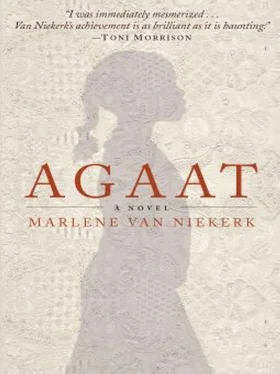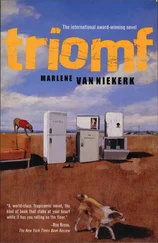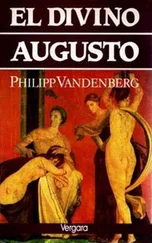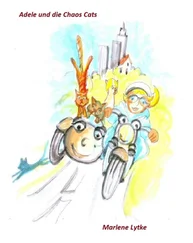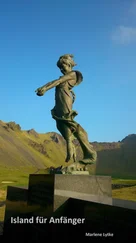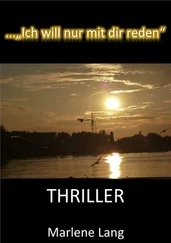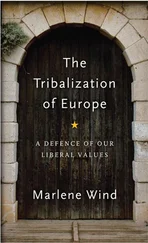Tring, goes the telephone. Again the receiver is slammed down.
She walks down the passage with loud confused steps. She walks past the kitchen door, she walks blindly into the sitting room. She kicks over something there. She sets it upright. It falls over again, metal on wood. Other things fall. Thud, it goes, thud, thud, thud. She’s back in the passage. She wants to come to me, but she can’t. She’s dragging something, wires across the floor.
What do I hear? A groan, a curse, a sob?
Two doors slam. The kitchen door, the screen door. And then another one, the outside room’s.
A dog barks.
What else do I hear? Windows are slammed shut, stiff copper catches violently pulled over the lip of the window frame, and then opened again.
Curtains are yanked shut, too far so that half of the window is exposed again. Plucked to and fro, two rings come undone.
I understand, Agaat. It was too much. Your voice, your words, your news, your request, it was too much for you to hear.
I see you. You’re standing in your room, you’re standing and you can’t stand any longer. You bend at the middle and you bend at the backs of your legs, your back hunches, you crawl forward over the linoleum. You take the poker, you pull out the grate. You crawl into your hearth, white cap first. You go and lie with your knees pulled up in the old black soot. You make yourself heavy and you make yourself dense and you sink away under the concrete with your fist in your mouth.
How can I blame you for wanting to vanish, Agaat? That you want to get away from me, away from the tyranny of me? More inescapable than ever, now that I can say or do nothing, now that I myself am floundered, and am immoveable as the stones. I would want to open myself to you and take you up into myself and comfort you. But I cannot, because I am your adversary exactly because I am as I am, mute and dense, and you are looking for a safe refuge from me. Under your own stones.
How can I accompany you to where you are now? At the heart of the hearth, under the soot, where you want to conceal yourself, under the foundations, under the stone strata, where they are blue, where you find a crevice into which to disappear, and haul in the block of stone on top of you, so that you can be occluded, with your arm over your head, with your fist in your mouth? Until nobody searches for you any more, to draw you out, to split you into parts and stretch you over spars and to infuse you and to chafe you and to rap you till you scream, till you sing, till you dance to their tune? Till you feel time click shut behind you and everything else falls silent, in your mouth no taste any more save the clean chalky tang of lime and scale?
So that I can come to be there with you, with my hand on your hip bone, with my hand on your shoulder tip to wait with you in the dark. For them to be rendered white and tidy, your bones, one by one, your clavicle, like a rudder, like an ensign, your shoulder blades like fans, your ribs shiny spokes, inside them a cleared hold, with every mast and beam caulked and planished in the dense rock face, the rock that retreats before your entry, a small fanfare. So that you can come to rest with all that is yours fixed and impermeable like pitch, your sails furled.
How can I be with you while you become a fern, a jaw of something inchoate, a keel, a beckoning nodule that flows in the grain of stone?
I shall go and lie with my head in that corner, with my ear on the place where the last trace of you lingered. I shall draw the suppurate stain of you into my nose, careful that you should not mark me, so that you shall be free of me, and free of yourself, a fume, a dark blemish that mists over the stone on which I am lying with my cheek.

Open at page 221, Agaat said. Her voice was clear. She put the old Farmer’s Handbook on your lap. End of October it was, 1960, the year of the botulism.
Ask me from the beginning, she said, ask me all the symptoms, and all the cures, ask me trick questions, I’ve learnt it all, I know everything now, I’ll never make a mistake again.
Never mind Agaat, you wanted to say, but your voice wouldn’t come. You sat there crying but she struck up and launched into her lesson. She wanted to force you upright. In spite of the battle between you, or for its sake, because how was she to fight you if you were weak? How was she to hate you?
You couldn’t come to terms with the loss of your Jersey cows, and her voice trying to create order and call things by their name, made you cry more. It was the third day that you had stayed in your room after the catastrophe with the botulism. Jakkie was with you most of the time in his cradle. Even his rosebud mouth, his little hand around your finger, couldn’t console you.
First bone-hunger, then general dirt-craving, she started. First os-teopha-gia, then allo-tri-opha-gia.
She sounded out the big Latin words.
Degenerated appetite it was. That’s how the vet had explained it to her, she said. Then she went and read up all the rest in her book.
Agaat looked at Jak who had come to listen in the doorway. He nodded at her to carry on. You felt how the accident had brought you closer to each other, closer, but in complex self-conscious ways. Jakkie woke up later in his cradle, he was the only one who reminded you all of your capacity for innocence.
When you could no longer contemplate the deaths and the putting-down, you took the child and left Agaat there with the autopsy. You saw how she came forward to lend a hand, her white apron like a standard in the midst of the carnage. And there she stood, three days later, grey with exhaustion, but with all the pieces of wire and cartridge cases and tin and horn and bone that had come out of the stomachs, scrubbed clean in a bucket to come and show you.
An unnatural craving, she said, her recitation-voice wilted with exhaustion, that’s what causes cows to eat carrion. Sheep can also get it. Then they eat the wrong things, then they get sick. Of germs in carcases. Bo-tu-li-nus germs. But it’s the soil that lacks something first. Phosphorus. And then the grazing. The problem is in the soil. It works through the grass into the blood. That’s what causes the wrong hunger in the first place, the lack in the soil.
It’s the first time the vet has seen it in The Spout, Agaat explained. Mostly it occurs in the north-west, it’s a poverty disease.
She indicated with the little hand an approximate direction supposed to represent the north-west.
We are rich, she said, but you have to know well on what soil you’re farming. It’s not just botulism they can get, but stiffsickness as well, cro-talism, then the back hunches and the limbs thicken and the mouse swells up.
On her strong arm, on the knob of the joint she showed where the mouse was situated, behind the front foot of the cow, just above the hoof.
Jak was standing in the doorway listening. You smiled at each other at Agaat’s book-learning, a small smile. He was flabbergasted. It was the first time that you’d seen him of his own volition deliver a pocket of onions and a pocket of potatoes and a leg of lamb to the vet to thank him, over and above his fee, for his support. And it was also the first time that you saw him give Agaat a present — a little bag of liquorice and a See magazine when he came back from town.
Even picked Jakkie up in his lap. As long as you just stay good and healthy, Pappa’s little bull, he said and stroked the child’s head.
That was not the only disaster with cows during Jakkie’s infancy.
Was it August of the following year? No, September ’61 it was, a month after Jakkie’s first birthday that Jak decided to add some more new Simmentals from South West Africa to his herd. New stud material needed to be added, he said, to the first herd of the German cattle that he’d started to build up in ’55 when he tired of his wheat experiment. You were reluctant. Jerseys were what you knew, delicate of hip and legs, finely-moulded of head. A Simmental, a dual-purpose animal with a blunt head and full shoulders and heavy legs, was to you an alien concept. To milk cows, help them calve and then after a few years to sell them for slaughter, felt to you like treason.
Читать дальше
